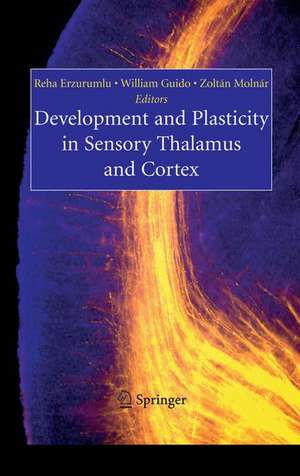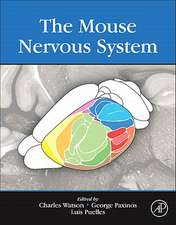Development and Plasticity in Sensory Thalamus and Cortex
Editat de Reha Erzurumlu, William Guido, Zoltan Molnaren Limba Engleză Hardback – aug 2006
| Toate formatele și edițiile | Preț | Express |
|---|---|---|
| Paperback (1) | 570.97 lei 38-44 zile | |
| Springer Us – 29 noi 2010 | 570.97 lei 38-44 zile | |
| Hardback (1) | 654.43 lei 43-57 zile | |
| Springer Us – aug 2006 | 654.43 lei 43-57 zile |
Preț: 654.43 lei
Preț vechi: 769.92 lei
-15% Nou
Puncte Express: 982
Preț estimativ în valută:
125.22€ • 131.10$ • 103.62£
125.22€ • 131.10$ • 103.62£
Carte tipărită la comandă
Livrare economică 07-21 aprilie
Preluare comenzi: 021 569.72.76
Specificații
ISBN-13: 9780387317984
ISBN-10: 0387317988
Pagini: 322
Ilustrații: XIV, 322 p. 65 illus., 29 illus. in color.
Dimensiuni: 178 x 254 x 21 mm
Greutate: 0.81 kg
Ediția:2006
Editura: Springer Us
Colecția Springer
Locul publicării:New York, NY, United States
ISBN-10: 0387317988
Pagini: 322
Ilustrații: XIV, 322 p. 65 illus., 29 illus. in color.
Dimensiuni: 178 x 254 x 21 mm
Greutate: 0.81 kg
Ediția:2006
Editura: Springer Us
Colecția Springer
Locul publicării:New York, NY, United States
Public țintă
ResearchCuprins
Pioneer Neurons and Interneurons in the Developing Subplate: Molecular Markers, Cell Birthdays, and Neurotransmitters.- Dual Roles of Transcription Factors in Forebrain Morphogenesis and Development of Axonal Pathways.- Subcortical and Neocortical Guidance of Area-specific Thalamic Innervation.- The Earliest Thalamocortical Interactions.- Molecular Basis for the Formation of Lamina-Specific Thalamocortical Projection.- Role of Citron K in the Development of Cerebral Cortex.- The Absence of Layer 4 Dramatically Alters Cortical Development in Ferret Somatosensory Cortex.- Influence of Thalamocortical Activity on Sensory Cortical Development and Plasticity.- Pathways to Barrel Development.- Patterning of the Somatosensory Maps with NMDA Receptors.- Presynaptic Mechanisms Controlling Axon Terminal Remodeling in the Thalamocortical and Retinogeniculate Systems.- Cellular Mechanisms Underlying the Remodeling of Retinogeniculate Connections.- A Model for Synaptic Refinement in Visual Thalamus.- Making and Breaking Eye-specific Projections to the Lateral Geniculate Nucleus.- LTD as a Mechanism for Map Plasticity in Rat Barrel Cortex.- High-Field (9.4T) Magnetic Resonance Imaging in Squirrel Monkey.
Textul de pe ultima copertă
Our brain evolved in a manner to enable itself to modify its structure depending on its environment. The thalamus is a large sensory relay station and it is closely integrated into the cortical circuits. Thalamic projections are responsible for dispatching most of the information to the cortex from the sensory periphery from early stages throughout life. The earliest inputs to the cortex are capable of constituting an extrinsic signal that plays a part in triggering other changes in the establishing cortical circuitry, leading to some aspects of specific regional differentiation and a real specializations. Unravelling the mechanism by which developing thalamic axons interact with the forming cortical circuitry in their target regions is important in understanding how cortical organization is determined. This book intends to bring together systems and molecular approaches on various fundamental issues on thalamocortical development and plasticity. Functional cortical circuits cannot be appreciated without thalamocortical circuits and cortical development cannot be considered without thalamocortical pathway development. The 16 chapters address key questions with diversity of techniques; ranging from molecular genetics, in vitro and in vivo methods to classical anatomical, electrophysiological and imaging procedures. The conceptual approaches formulated in these chapters should be a rich source for future research in this area.
Caracteristici
Provides an update on the multitude of technical and experimental approaches in understanding the development and plasticity of the mammalian sensory thalamus and neocortex and provides a synthetic theoretical framework for future studies Includes supplementary material: sn.pub/extras






